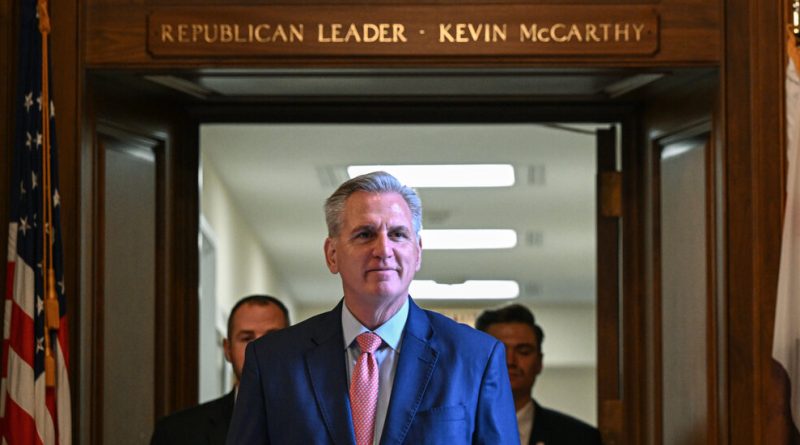How McCarthy’s Speaker Election Bid Could Devolve Into Chaos
[ad_1]
The election of the House speaker on the floor of the chamber is usually a largely ceremonial exercise devoid of surprises.
But if Representative Kevin McCarthy of California, the Republican leader, is unable to put down a rebellion among a group of hard-right lawmakers before the vote on Tuesday, the result could be a whirl of chaos not seen on the House floor in a century.
Mr. McCarthy has pledged to fight for the speakership on the House floor until the very end, even if it requires lawmakers to vote more than once.
Every speaker since 1923 has been able to clinch the gavel after just one vote, but there is a precedent in the House’s long history of turbulent elections. In 1855, for example, electing a speaker took two months and 133 ballots to yield Representative Nathaniel P. Banks of Massachusetts the winner, a reflection of a House divided by antebellum factions.
Here’s what you need to know about the election.
How does electing a new speaker play out?
On the first day the new House is in session, choosing a new speaker is the first matter of business that lawmakers must take up. It happens even before newly elected representatives are sworn in, and must be resolved before other business resumes.
Lawmakers will congregate on the House floor, and leaders from each party will nominate a candidate for speaker. In this case, Republicans will nominate Mr. McCarthy, and Democrats will nominate Representative Hakeem Jeffries of New York, the minority leader.
The House clerk will then proceed to an alphabetical roll-call vote. To vote, lawmakers must reply with a name. That could be Mr. McCarthy, Mr. Jeffries — or, if they wish to lodge a type of protest vote, any name of their choosing.
A New U.S. Congress Takes Shape
Following the 2022 midterm elections, Democrats maintained control of the Senate while Republicans flipped the House.
Capitol Hill denizens often use shorthand and say the threshold to become speaker is 218 votes, or a simple majority. But it is not that straightforward: House precedents stipulate that electing a speaker requires a majority of the votes cast by members “for a person by name.”
That means that Mr. McCarthy could still win the speakership even if he does not get to 218 votes, by persuading lawmakers who do not want to vote for him to instead vote “present” or to miss the vote entirely.
That is not an uncommon occurrence. In 2015, John Boehner was elected as speaker with 216 votes, as was Nancy Pelosi in 2021.
If Mr. McCarthy is unable to capture the votes needed to become speaker, lawmakers would proceed to a second ballot — meaning that they would have to do another roll-call vote. The last time that happened was in 1923, when the speaker was elected after nine ballots and fevered rounds of behind-the-scenes haggling.
What happens if McCarthy falls short?
Because it is so rare for a speaker election to require more than one vote, there is little modern precedent to govern the chaos that could ensue. But there are a few clear-cut options available to lawmakers.
If Mr. McCarthy failed to win the speaker’s gavel on the first ballot, he and his allies would most likely begin horse-trading with rebel lawmakers on the House floor or in the cloakroom to try to win their support. Some Republicans have privately noted that it could become obvious more quickly than usual if Mr. McCarthy will fall short on the first ballot, because a number of lawmakers who have vowed to oppose him will be called on early in the alphabetical vote.
At the same time, other lawmakers could throw their hats into the ring as potential consensus candidates. Or Republican rank-and-file members might try to draft one of their colleagues into running if it appears that no amount of cajoling will win Mr. McCarthy the votes he needs.
A lawmaker could offer a resolution to the election process, such as lowering the vote threshold needed to become speaker and endorsing a plurality winner.
Lawmakers might also try to take a break from voting and put forward a motion to adjourn. That would require the approval of a majority of the House: 218 votes.
Unless they move to adjourn, lawmakers will have to keep voting until a speaker is elected.
A deadlock may prompt many more rounds of voting.
Of the more than 120 times since 1789 that the House has elected a new speaker, there have been only 14 instances in which the process required multiple ballots, according to the Congressional Research Service.
The drawn-out elevation of Mr. Banks to the speakership — a process that began in 1855 and ended in 1856 — was likened by the office of the House historian to a “recurring nightmare.”
The first vote began on a Monday in December 1855, with lawmakers holding four votes that day. There were “five more on Tuesday, six more on Wednesday, another six on Thursday, six again on Friday, and six more on Saturday,” according to the office.
Mr. Banks was not elected until early February 1856, a period in which no other congressional business was conducted. The stretch included a three-hour question-and-answer session for speaker candidates over the spread of slavery to the western territories.
The speaker race ended only after lawmakers, no doubt exhausted by their marathon voting sessions, approved a resolution creating a plurality winner. Mr. Banks won with just 103 votes.
[ad_2]
Source link
